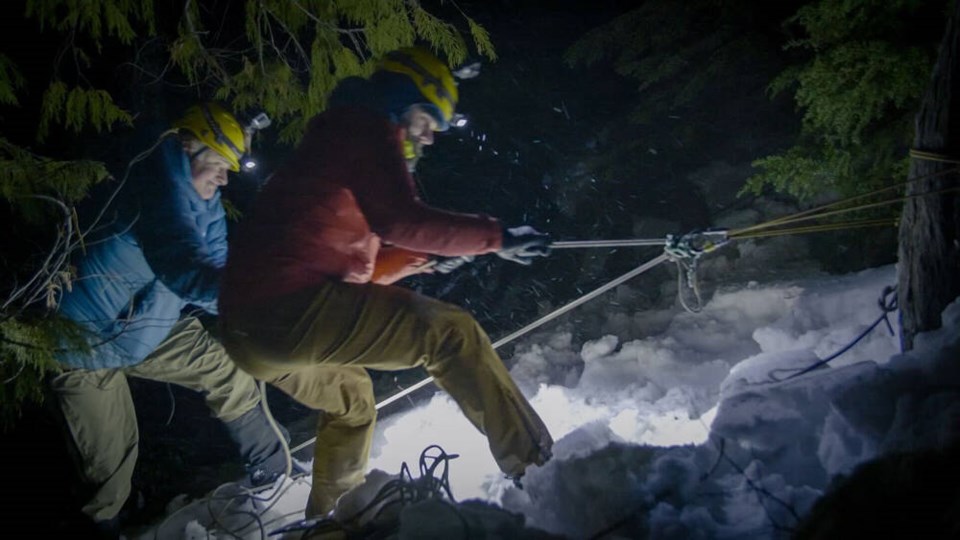With 158 callouts, 2023 was the second busiest ever recorded for North Shore Rescue.
But, despite being tasked more than three times per week, not one mission for a lost hiker or injured skier ended in a fatality in the North Shore Mountains.
It’s a stat that makes team leader Mike Danks proud, but he quickly puts all of the credit on the level of planning, training and commitment the team’s volunteers put in.
“It is a very efficient system that we have set up here. Right from the get-go of the call coming in, we have multiple people on a conference call, a helicopter is being called for, a doctor is being arranged, teams are moving to the search base. I think everything is really starting to streamline and come together,” he said. “I think if you look at the calibre of our membership, that speaks to our response.”
Over those 158 missions, the team logged 4,500 volunteer hours in the field. They estimate another 4,000 hours were spent in training, and at least that much on administrative tasks, fundraising, maintenance and public education.
Almost half of the team’s calls required the use of a helicopter, including 10 flights with night vision. They used Talon’s hoist system 29 times over the year.
Because of their unique training and access to helicopters, North Shore Rescue members were called to assist other B.C. search and rescue teams 38 times in 2023, across the Lower Mainland, Sea to Sky region, on Vancouver Island, the Sunshine Coast and in the Interior.
Only 2021 – a year when COVID-19 restrictions flooded the trails with inexperienced hikers – had more calls with 226.
Among the highlights for 2023: finding a lost and hypothermic hiker on Mount Seymour with a drone-mounted thermal camera; getting called out four times in a single night on Thanksgiving weekend; and rescuing an out-of-bounds skier who was injured in an avalanche off the Howe Sound Crest Trail.
Being busy is a good thing, in some ways, Danks has found. The more rescues they carry out, the more donations seem to come in.
“We never want to take that for granted because the costs are continuously going up. And there’s always replacement of equipment that we need to factor in,” he said.
The team relies on sponsors and contributions from the public to fund the very expensive training and certification volunteers require if they want to keep saving lives, especially when it comes to using helicopters to rescue those in the most dangerous predicaments.
“It takes money to do that. And it takes dedication and commitment and volunteers to keep those skills at a very high level,” he said. “If we’re struggling to find money to do the training, then we’re not going to be able to provide that level of service.”
That service hasn’t gone unnoticed. In 2023, the Honourable Company of Air Pilots awarded North Shore Rescue with its Masters Trophy for outstanding, enduring, and meritorious search and rescue service. The award cites the team's “expert skillset and innovative techniques, commitment to continual training and improvement, and dedication to the preservation of life,” but also their contributions to rescue efforts around B.C. in November of 2021, when an atmospheric river flooded swaths of the province.
Also in 2023, the North Shore Rescue family grew, in a way. One of NSR’s major donors made significant contributions locally as well as to Bergwacht Oberau, the mountain rescue team in his hometown in Germany. When Danks and several other members travelled to Europe for a search and rescue conference in the fall, they met up with their German counterparts.
“The pinnacle of [the donor’s] wish was that we form a relationship with a sister team in Oberau, and the stars really lined up well,” he said. “We got to actually do some training with them and really form a relationship.”
In April, North Shore Rescue will be hosting the Oberau team for training here.
And for the first time three years, North Shore Rescue will be putting out a call for new members to try out for the team. Danks said it is critical for succession planning, especially as the current leadership group ages.
“We’re getting into our late-40s. And we really need that new wave of volunteers, the new leaders of North Shore Rescue to come in and start at the ground and work their way through,” he said.
Danks said he worries the cost of housing on the North Shore is going to make it harder to find young people who live close enough to make it to calls.
For those who are selected, it tends to be a lasting commitment, he added.
“The majority of them are 10 years-plus. We have people that are 20 years-plus, and then we have people that are 30 and 40 years-plus, and they’re still actively helping on the team,” he said.
This story was included in a special North Shore Rescue print feature that ran in the Jan. 24 edition of the North Shore News. Other stories from the feature include a look at new technology that lets North Shore Rescue locate out-of-service cellphones, a generous donation that funded the purchase of life-saving avalanche backpacks for all members of the team, and a look back at the career of legendary team leader Tim Jones 10 years after his sudden death. You can also read the complete digital edition of the print feature here.



